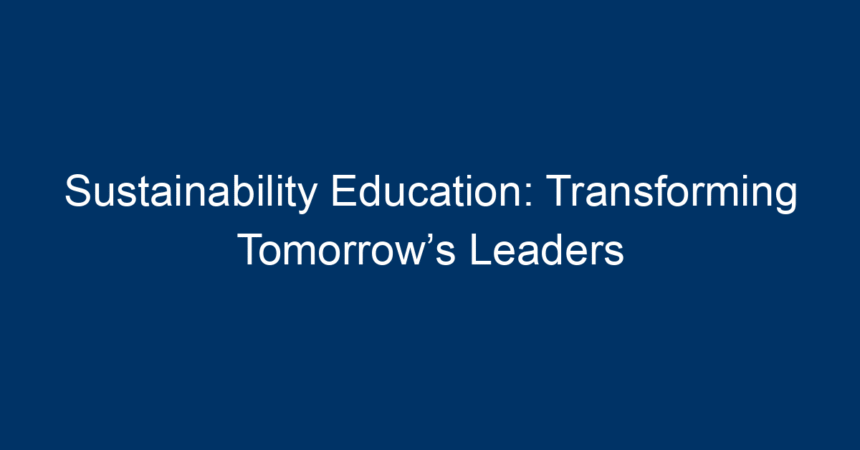In an era where climate change and environmental degradation are at the forefront of global discourse, sustainability education emerges as a vital component in shaping the leaders of tomorrow. By equipping young individuals with the skills, knowledge, and values necessary to address pressing environmental challenges, we can create a more sustainable future. This article explores the significance of sustainability education, its impact on various sectors, and actionable steps to integrate it into curricula internationally.
Understanding Sustainability Education
Sustainability education is an interdisciplinary approach that seeks to foster a deep understanding of sustainability principles among students. This involves teaching not only environmental science but also social and economic dimensions of sustainability. By examining interconnections between human activity and environmental health, students develop critical thinking skills necessary for problem-solving in a complex world.
The Importance of Sustainability Education
-
Fostering Environmental Awareness
One of the primary goals of sustainability education is to instill a sense of responsibility towards the environment. With the alarming rate of biodiversity loss and climate change, students who engage in sustainability education become aware of their ecological footprints and the impacts of their actions. -
Empowering Future Leaders
Sustainability education empowers young minds to become eco-conscious leaders. By teaching them about sustainable practices and the significance of social equity, these future leaders can drive change in their communities and workplaces. - Encouraging Critical Thinking
Addressing environmental issues requires innovative solutions. Sustainability education encourages critical thinking and creative problem-solving, equipping students to tackle challenges such as resource depletion and pollution.
Key Components of Sustainability Education
To effectively integrate sustainability education into learning environments, it is essential to consider its diverse components:
Holistic Curriculum Development
Interdisciplinary Learning: Sustainability education should not be confined to one subject area. It should encompass science, social studies, economics, and even art. This holistic approach allows students to see the bigger picture and understand the interconnectedness of different systems.
Practical Learning Experiences
Hands-on Activities: Engaging students in practical projects, such as community gardens, recycling programs, and conservation efforts, helps translate theoretical knowledge into action. These experiences build a greater connection to the environment and foster teamwork.
Collaboration and Partnerships
Community Engagement: Schools should partner with local organizations, government agencies, and businesses to create a comprehensive learning experience. Collaborations can lead to real-world projects that enhance student learning and community sustainability.
Technology Integration
Utilizing Digital Tools: Incorporating technology into sustainability education can enhance student engagement. Online platforms, virtual reality, and simulations can bring complex sustainability concepts to life, making them more relatable and easier to understand.
The Role of Teachers in Sustainability Education
Teachers play a pivotal role in driving sustainability education. Their attitudes, knowledge, and teaching methods are instrumental in shaping students’ understanding of sustainability.
Professional Development
To effectively teach sustainability topics, educators must undergo continuous professional development. Workshops, conferences, and online courses focused on sustainability will equip teachers with the latest information, teaching strategies, and tools to engage their students.
Creating a Supportive Classroom Environment
Educators should foster an inclusive and supportive classroom environment where open dialogue about sustainability issues can flourish. Encouraging student questions and debates helps to build critical thinking and collaborative skills.
The Impact of Sustainability Education on Various Sectors
Sustainability education’s influence extends beyond the classroom, impacting various sectors:
Business and Industry
As organizations increasingly focus on sustainability, having a workforce educated on these issues is crucial. Sustainability education prepares students for careers in green technology, sustainable agriculture, renewable energy, and corporate social responsibility.
Government and Policy Making
Future leaders educated about sustainability are better equipped to make informed decisions as policymakers. They will advocate for policies that prioritize environmental protection and social equity, fostering a sustainable future.
Healthcare
In the healthcare sector, professionals trained in sustainability principles can lead initiatives targeting pollution reduction and resource management. Understanding the relationship between environmental health and human health is crucial for dealing with public health challenges.
Global Initiatives Promoting Sustainability Education
Several global initiatives are reshaping sustainability education, ensuring it reaches a broader audience:
United Nations Sustainable Development Goals (SDGs)
The UN’s 17 Sustainable Development Goals highlight the importance of education, particularly Goal 4, which emphasizes quality education and lifelong learning opportunities. Many countries incorporate these goals into their education systems, promoting sustainability education at all levels.
The Global Schools Program
This initiative encourages schools to adopt sustainability education into their curriculums. By providing resources and support, the program aims to create a network of schools that prioritize sustainability, empowering students to become change agents.
The Eco-Schools Program
Eco-Schools provides a framework for schools to incorporate sustainability into their operations. Schools engage in various environmental projects, promote sustainability in their communities, and encourage student involvement through leadership roles.
Challenges to Implementing Sustainability Education
While the benefits of sustainability education are clear, several challenges hinder its widespread implementation:
Resistance to Change
Many educational institutions may hesitate to adopt new curricula due to existing frameworks. Overcoming resistance requires robust advocacy and demonstrating the tangible benefits of integrating sustainability education.
Insufficient Resources
In some regions, schools lack the necessary resources – including funding, professional development, and materials – to implement sustainability education effectively. Addressing these disparities is essential for equitable access to quality sustainability teaching.
Lack of Awareness
Many stakeholders, including educators, parents, and policymakers, may not fully understand the significance of sustainability education. Increasing awareness through community outreach and advocacy can help garner support for necessary changes.
Actionable Insights for Promoting Sustainability Education
-
Advocate for Policy Change: Engage with local, state, and national leaders to champion the integration of sustainability education into school curricula.
-
Encourage Community Involvement: Promote partnerships between schools and local organizations to enhance practical learning experiences for students.
-
Support Teacher Training: Invest in professional development programs focused on sustainability education methodologies.
-
Utilize Digital Resources: Use online platforms, webinars, and publications to stay informed about sustainability education trends and best practices.
- Engage Students in Sustainable Practices: Encourage students to participate in community service projects focused on sustainability, such as clean-up drives, tree planting, and conservation efforts.
Conclusion
Sustainability education is not merely a trend; it is a crucial endeavor that empowers the leaders of tomorrow to tackle global challenges. By fostering environmental awareness, critical thinking, and collaborative problem-solving, we lay a foundation for a sustainable future. As educators, policymakers, and community members, it is our responsibility to champion sustainability education, ensuring that every student is equipped to make informed decisions that contribute to the well-being of our planet. By taking actionable steps and promoting awareness, we can transform our education systems and, ultimately, our world.




